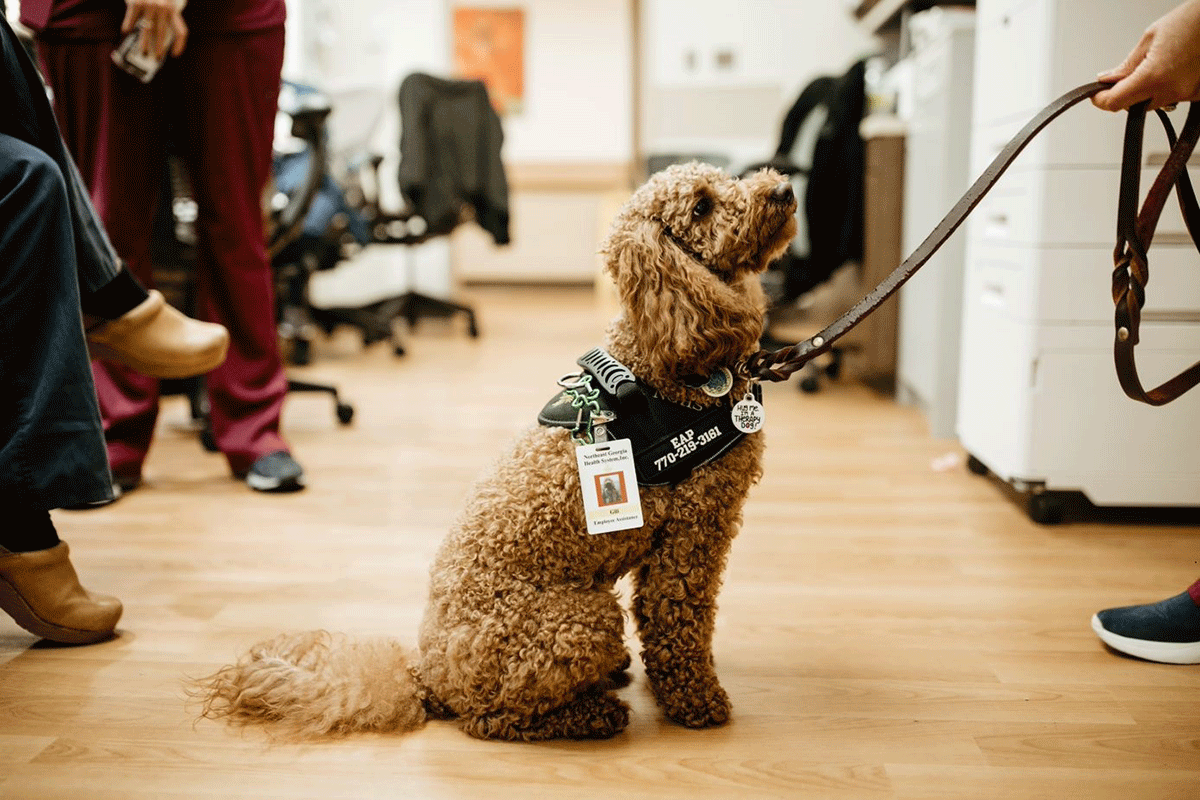Having a medical condition that requires you to spend time in the hospital can be stressful for the mind and the body. Northeast Georgia Health System (NGHS) is using therapy dogs to help change that.
Just think about it—when you spend time with a pet at home, you probably experience a wide range of benefits. Your blood pressure drops, you feel less stressed and tense, and you’re in a better mood.
Those are tangible benefits that you can feel, and they’re also benefits that have been researched and noted in the medical field. That’s part of the reason why many hospitals and health systems, NGHS included, are bringing therapy dogs and other forms of pet therapy into the mix.
How pet therapy works
You may have read about the health benefits of having a pet or seen a report about it on the news. Owning a pet can encourage you to become a healthier version of yourself. When you own a dog, you usually get at least a little exercise when your dog does, for example.
Having a pet also increases the opportunities to socialize, which lessens the risk of loneliness and isolation, and encourages you to get outside, so you can reap the benefits of nature.
But did you know that there are also measurable health benefits attached to having a pet? It’s true. When you have a pet, you benefit physically, mentally, emotionally and cognitively. Pet ownership is connected with healthier blood pressure and cholesterol levels, and it’s also tied to a reduced risk of loneliness and depression.
Knowing the benefits of having a pet, health organizations are now channeling those benefits into a health setting through pet therapy. Therapy dogs, like those visiting the halls at NGHS, are one form of pet therapy.
Led by human volunteers, therapy dogs regularly visit NGHS, interacting with patients and their loved ones. This does more than provide a warm and fuzzy diversion—it offers our patients a complementary therapy that works alongside their medical care to help improve their overall wellness.
The therapy dogs that visit NGHS are part of a growing number across the United States and the world. In the United States alone, there are more than 50,000 therapy dogs working in hospitals and other settings, including schools.
Therapy dogs in the hospital setting
You might be wondering who can benefit from pet therapy. The short answer is anyone – patients and hospital staff alike.
Patients receiving medical care of any type can benefit from interacting with animals. This includes those who are visiting the hospital for an acute medical need, like patients in the Emergency Department, and those who have long-term medical issues, like patients being treated for cancer, rehabilitating after a stroke or a heart health issue, or even receiving hospice care.
While still in its infancy, both formal and anecdotal research is showing healthcare workers also benefit from workplace visits from our canine companions. In 2014, the Hospital of University of Pennsylvania gained national attention for their “Pet the Pooch” program aimed specifically at providing stress relief to hospital staff. Similarly, PeaceHealth St. Joseph Medical Center and BC Children’s Hospital began bringing in dogs specifically for staff during the Pandemic.
Aptly known as “man’s best friend,” therapy dogs are quick to offer a gentle nuzzle and unconditional love. That alone is a benefit. But research has uncovered even greater benefits.
A study published last year in the medical journal PLoS One, for example, found that patients visiting the Emergency Department who interacted with a therapy dog for as little as 10 minutes experienced reduced pain, anxiety and depression.
That’s not all, though. Research has also uncovered other benefits for patients who engage with therapy dogs, including:
- Enhanced self-esteem
- Improved cognitive health
- Improved communication skills
- Improved energy levels
- Lower risk of depression, associated with increased oxytocin levels
- Lower risk of heart failure due to lowered blood pressure and cholesterol
- Reduced confusion
- Reduced risk of insomnia
- Reduced muscle tension
Closer to home, Gili, NGHS’ first dedicated canine employee joined the staff in 2020. Gili works closely to provide support to staff across the health system. She always responds with the Employee Assistance team when particularly traumatic events impact an employee group and routinely sits with clients for individual counseling sessions, as well as rounding on medical floors across the health system. Her visits prompt smiles and squeals of delight. For a few short minutes, staff can receive much-appreciated unconditional love. Visits often end with a comment of “best day ever” and always a heartfelt “thank you.” Every time, the power of love is on display between a therapy dog and those who selflessly provide so much to others.
While dogs alone can’t provide medical care, they now play a well-understood role in promoting health and wellness in the hospital setting. Pet therapy can be used in coordination with other treatment therapies to help promote improved well-being and health.
After all, what’s not to love about a little extra medical attention…when it comes from a therapy dog?
Learn More
Animals have healing powers! At Northeast Georgia Health System, we encourage engaging with animals in multiple ways, including pet therapy services throughout the health system and the Christian-David Family Pet Park at Northeast Georgia Medical Center Gainesville.



